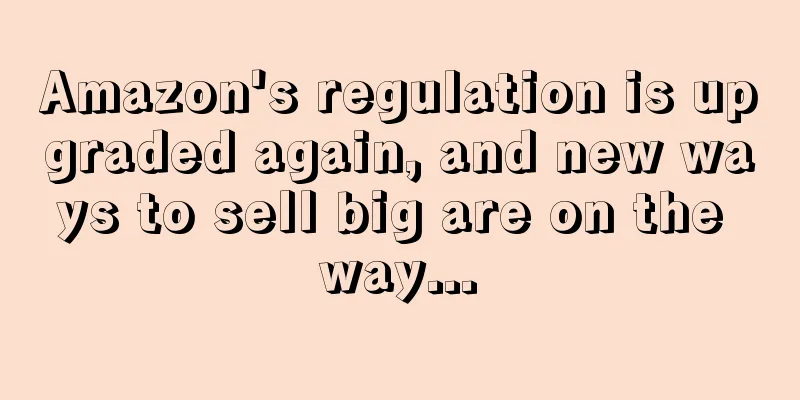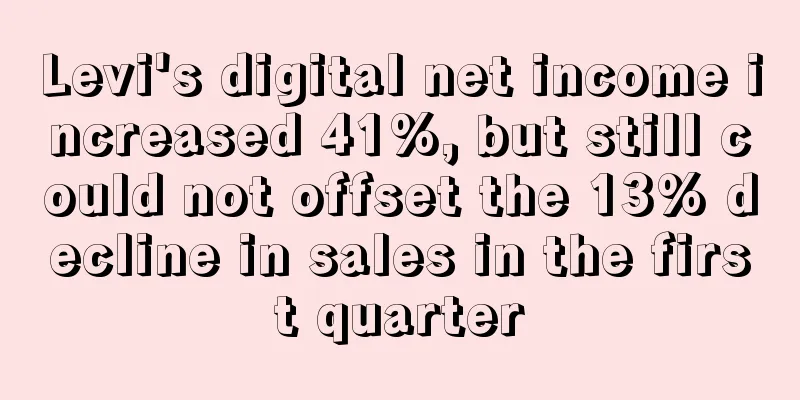Amazon's regulation is upgraded again, and new ways to sell big are on the way...

|
Recently, many top sellers’ accounts were suspended by Amazon, causing a lot of uproar among sellers. To a certain extent, this indicates that the platform supervision has been upgraded again . Next, the platform sellers who have violated the rules should be more cautious. With the upgraded supervision, the advanced nature of the new gameplay and new operation models in the industry has gradually emerged.
Multiple big seller accounts were blocked, and Amazon is strictly controlling behaviors such as manipulating reviews
In May, news broke out one after another in the cross-border e-commerce circle. The accounts of several top sellers were blocked, and the news that their brands became unsalable irritated the sensitive nerves of many sellers.
Why do big sellers keep getting into trouble? This may be related to foreign media reports on Chinese sellers’ fake orders and manipulation of reviews. Some time ago, sellers were exposed for using after-sales cards to conduct reviews, and foreign media criticized Amazon for not monitoring them properly. Then, foreign media reported that 13 million fake order information was leaked and 200,000 sellers were involved in fake orders.
Foreign media reports have exposed Amazon’s problems. Under multiple pressures, the platform has upgraded its supervision and strictly controlled behaviors such as serious manipulation of reviews.
Amazon's regulation began with a group of top sellers. Many top-selling products were suddenly unavailable for sale due to suspected illegal manipulation of reviews. Soon after, some small and medium-sized sellers also received warnings that their accounts were at risk of being deactivated. After confirming with the platform, it was found that it was due to fake reviews. A few days after receiving the deactivation warning, a group of small and medium-sized sellers' accounts were also blocked.
In response to this matter, Amazon's official response was roughly as follows: the platform has established corresponding systems and processes to monitor suspicious behavior, and will punish violations by suspending accounts and revoking sales rights.
When sellers’ stores come under platform supervision, they go bankrupt, and many well-known brands are deeply affected.
Many domestic media have also reported on this. Industry insiders have previously noticed that some media have mentioned that some popular sub-brands have no search results. The editor learned from professionals that if the search prompt is "no results for xxx", this may be because the delivery address is not the sales area specified by the merchant, or the search content is not within the product description keyword range set by the merchant, resulting in the inability to display relevant search results normally. Stores or products that have been restricted by Amazon's sales authority measures are generally not displayed in this way.
"Since Amazon's controls are all machine algorithm-based, it is inevitable that it will 'affect' and 'accidentally kill' compliant sellers. In this incident, there is a possibility of such 'accidental killing'." A senior cross-border e-commerce operator said that generally in the case of "accidental killing", Amazon can restore the seller's operating rights after the seller provides evidence on his own.
To a certain extent, the compliance of top sellers is relatively good. At present, many Amazon sellers still have serious violations. The tightening of platform control is a good thing for large sellers with strong compliance awareness. It severely deters violations and drives the overall ecosystem to develop in a fairer and healthier direction; at the same time, it can also reduce the number of non-compliant sellers.
Why would Chinese sellers rather have their accounts blocked than illegally manipulate reviews?
After a group of top sellers were banned, a soul-searching question arose: Why would Amazon sellers take the risk of violating regulations and manipulating reviews? This has to do with their operating model.
Currently, the categories operated by domestic leading sellers on Amazon are mainly consumer electronics, home furnishings, clothing, etc., and are divided into two main operation modes: branded and non-branded distribution.
Well-known leading branded e-commerce companies all have their own main categories. Anker, Aoji, Paton, Zebao, and Chenbei mainly sell consumer electronics or furniture and home appliances. The main clothing categories include Shein and Saiwei. Non-branded distribution sellers are mainly Tongtuo, Youkeshu, etc. Non-branded distribution products mainly rely on a wide range of categories and price competition to gain competitive advantages in the sinking market; while branded merchants target consumers who have higher requirements for product quality and service.
At this stage, many sellers are undergoing branding transformation, and branding itself has become a trend.
How to stand out in the tide of branding, the specific operation methods of major sellers, such as the promotion methods adopted and the degree of promotion required, are highly related to the categories operated by major sellers. The operating categories can be divided into two categories: standard products and non-standard products.
3. Standard products: Consumer electronics belong to the standard product type, such as Bluetooth headsets, Bluetooth speakers, power cords, power banks, etc. Generally speaking, sellers of standard products will not develop many SKUs, and the iterative update cycle is also relatively long, mainly relying on operations to promote hot products.
Except for a small number of leading large sellers who conduct in-depth research and development and differentiation of their products, most sellers of standard products seek supply chain OEM. The characteristics of the products themselves determine that the performance differences are limited, and they are horizontally comparable, and there are also many competing brands.
Amazon 's "customer first" principle determines that products with good customer reviews can get more traffic, and once a standard product listing becomes a hot product, it can gradually gain huge sales and profits. Therefore, sellers of standard products pay special attention to consumers' comments, so some sellers will take risks and get good reviews at all costs.
At the same time, for products such as consumer electronics that have obvious generational changes, if generational changes occur, the space for old products will quickly disappear. The pressure on standard product sellers to "smash" hot products in a short period of time to obtain excess profits and win the competition, as well as the pressure to avoid being replaced by new products, will prompt standard products to be promoted and operated more vigorously.
4. Non-standard products: Non-standard products are those that cannot be standardized or regulated and are more personalized, such as clothing, shoes and hats. Since consumers have different preferences, the products they operate need to be rich and need to be quickly iterated to meet the different preferences of consumers and meet the needs of consumers for updates and iterations. Therefore, even if a single product becomes a popular product, its sales volume is relatively limited, far less than the sales volume of standard products.
Although non-standard brand sellers also value reviews, they are not motivated to obtain reviews for a single product at a greater cost, because the same cost cannot obtain the same skyrocketing sales and revenue as standard products. If the product still needs to be iterated, such as clothing that needs to be constantly updated, the reviews obtained for the old models can only be displayed for a certain period of time, so new products need to be updated. Unlike standard products, if there are no generational products, their iteration speed is relatively slow, and a product can be sold for a long time, the display and drainage of reviews will bring greater benefits.
At the same time, although non-standard products need to be constantly updated, they will not face the pressure of generational change. They are generally stable and will not completely die out in the generational change like some products in the consumer electronics category. However, the iteration of non-standard products is slow, and there are many old brands. It is difficult for sellers to quickly build a brand with the help of new products.
This also determines the number of domestic sellers selling standard products. In addition, the earliest batch of Chinese sellers started out by relying on 3C products. There are many domestic sellers of standard products, so the importance of reviews is self-evident. As competition intensifies, more and more sellers are willing to risk having their accounts suspended to illegally post reviews.
How should sellers deal with increasingly stringent platform supervision?
As platform supervision is upgraded, these sellers who violate regulations by posting fake reviews will inevitably face huge risks, including having their accounts suspended by Amazon, which will once again cause "shocks" in the industry .
So, how should sellers deal with the increasingly stringent platform supervision? To address this issue, the core strategy is to develop a multi-category, multi-brand, and multi-channel model to reduce operational risks. There are four reasons for this layout:
1) There is a ceiling on the market space for a single category; 2) In categories such as consumer electronics, if a new competitor emerges that is powerful enough to disrupt existing products, it will have a devastating impact on existing sellers; 3) Since Amazon is controlled by machine algorithms and the control logic is strictly confidential, it is difficult for all sellers to closely grasp the platform's control rules. If the platform's control rules are updated but the seller's behavior is not adjusted in time, or if the platform uses a machine control mode to uniformly control the seller's behavior and causes "accidental killing", it will have a significant impact on such sellers of a single brand and a single category; 4) Seeking other categories that are suitable for the company's characteristics and can achieve multi-dimensional synergy, and promoting the company's spiral growth with a multi-brand, multi-category, and multi-channel matrix development model is a direction worthy of research.
Taking the development of multiple categories as an example, developing new categories is one of the ways for sellers to quickly increase sales. Standard products in the 3C category are frequently iterated, born and die quickly, and sometimes a hit product comes out and quickly creates one or several new brands. Compared with competing with existing brands in the red ocean market, it is easier to create a brand in a new category.
Anker is one of the beneficiaries of the development of new categories. It started with mobile power banks and then expanded to wireless headphones, sweeping robots, smart homes and other categories, and quickly created new brands such as Soundcore, eufy, and Roav. Among them, the annual revenue of the two new brands Soundcore and eufy has exceeded 1.5 billion.
In the multi-category and multi-brand track, Savi is also one of the typical representatives of strategic planning. At present, it has developed homewear brand Ekouaer, men's clothing brand Coofandy, underwear brand Avidlove, etc. in the clothing field that it has been deeply involved in for many years . Many of these independent brands have annual revenues of hundreds of millions. At the same time, its sports equipment brand ANCHEER and home furnishing brand HOMDOX are also on par with each other, and the overall multi-brand and multi-category layout has achieved remarkable results.
The cross-border e-commerce industry has never lacked the competition and emergence of top players and seed players. From the previous blue ocean period to the current mature stage, cross-border sellers need to face not only external policies and changes in consumer demand, but also the long-term development of their own plans.
As a platform seller, actively respond to supervision, do not cross the red line, and constantly adapt to the trend of the times on the basis of compliance Only then can the business last long.
In fact, Amazon's control this time is not a bad thing, whether for the platform or cross-border e-commerce sellers. For the platform, it optimizes the operating environment, and for sellers, it allows everyone to compete in a relatively fair track, gradually eliminating a group of vicious competitors, which is more beneficial to compliant sellers. Amazon, big seller, operation |
>>: Sales increased by 142%! Korean umbrella-related products are selling well
Recommend
LightInTheBox's Q3 revenue fell 1.3% year-on-year, with a net loss of US$6.1 million
Recently, many cross-border sellers, including An...
What is Sellery
Sellery is a simple app that gives you control ov...
What is Genesis? Genesis Review, Features
Genesis Capital Markets Software Provider. About ...
Digital advertising consultancy ADA: Beauty, electronics and travel products are most popular during Ramadan 2021
Affected by the epidemic, consumers have had to q...
What is gabrielaartigas? gabrielaartigas Review, Features
gabrielaartigas is a jewelry brand founded in 200...
What is Gorilla ROI? Gorilla ROI Review, Features
Gorilla ROI automatically connects Amazon data to ...
What is Afterbuy? Afterbuy Review, Features
<span data-docs-delta="[[20,{"gallery"...
Breaking through the peak season! Sellers discover new secrets to boost traffic
The year-end peak season has arrived. As competit...
After the Suez Canal was blocked, the number of inquiries about China-Europe trains doubled
The Suez Canal was blocked for a whole week from ...
What is Leomax? Leomax Review, Features
Leomax is a leading multi-channel direct retail ho...
What is Winlink Technology? Winlink Technology Review, Features
Yinglingtong Technology (Guangzhou Yingling Inform...
European station becomes "abandoned child"? Sellers repeatedly cut product lines to "save their lives"
VAT, EPR, UKCA , tariffs, shipping costs, and ris...
Kohl's adds 2 million new customers thanks to Amazon's returns program
“We’re especially seeing this with the increase i...
A large number of eBay accounts were blocked for unknown reasons. Resolver has handled thousands of seller complaints
Foreign media reported that more and more sellers...
What is Currencies Direct & Currencies Direct Review
Currencies Direct is a British financial company ...









